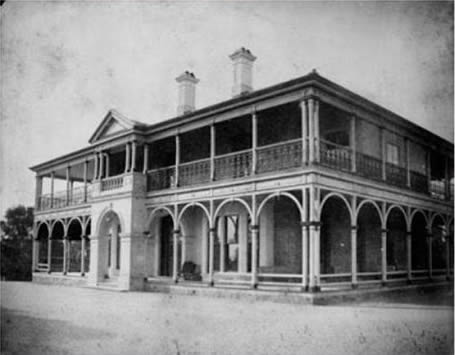BRISBANE & the TRIP NORTH
The office building was in the city but was a secretive place and I never knew what went on there and can't remember what duties I carried out. I stayed at Whytecliffe House 'Barracks' and it was wonderful historic home and quite close to the city. The accommodation (a real bed) and food were great, so I was very disappointed to be posted north to Macrossan. I do not remember the names or faces of anyone there and the posting is not shown on my papers. I was never told the reason for any of my movements from one place to another.
 Whytecliffe House
Whytecliffe House
I was held up in Brisbane for three days after my posting came through because the bridge between Home Hill and Ayr was washed out in a big flood on the Burdekin River. The engine, some carriages of train with the driver and fireman were lost. I ran out of money and found that Alan New was the Railway Transport Officer for the Air Force at the station and he lent me 20 pounds, to tide me over. He had been a Sergeant in the Orderly Room at Nowra and was quiet, kindly fellow. He was trusting, never asked for an IOU and I posted him a Money Order, when I arrived at Macrossan.
THE JOURNEY TO MACROSSAAN
That train journey was something I will never forget, as it lasted three days and nights. It was the first train that went north after the flood and carried civilians, as well as troops. When it left Brisbane, it was so crowded that people were standing in the corridors and some were going as far as Cairns. Later, they sat on the floor, suitcases or other objects. All service personnel were given seats. Our compartment had a woman and 3 children, as well as 3 WAAAF. At night, we slept or rather tried to sleep on the floor in the corridors, with our heads on kit-bags or clothes, so that the mother and the children could lie down. In some ways, it was an awful journey but we did have some fun.
The WAAAF very soon changed into their jeans for comfort and if there were other servicewomen on the train, I don't remember them. The toilets soon became smelly, the water to drink was warm and I can't remember the arrangements for meals. However, after we left Rockhampton and out in the 'never never' heading west for Longreach, the local C.W.A. and possibly Red Cross came 'to do their bit' for the war effort. The train was not quite so crowded after leaving that town.
As this train was the first with troops to make this journey via the west, it gave them the opportunity to do their duty. They handed drinks, cold water, sandwiches, cakes, scones and biscuits to us through the windows. Water for drinking and washing was in very short supply. I can't remember but I think the civvies also benefited.
Also, through the open windows for ventilation, as we travelled on, were clouds of dust, prickly bushes and lot of heat that made life very unpleasant. Our clothes and bodies were filthy. The train was very slow and if another one travelling in the opposite direction approached, they both came to a stop. Drivers, guards and others alighted for a drink, some eats and a smoke. No wonder the trains here had a reputation for often running late and this was a topic of conversation by many.
The guard seemed to dislike servicewomen and on the first night 'accidentally' kept bumping into us, as he walked through the carriage. There was a group of 7th Division Soldiers and Pipers travelling to Atherton after Embarkation Leave and we told them about the guards actions. They had a stern chat to him (threatening bodily harm) and he was very careful from that time onwards. It must have been very difficult for him to find foot space with so many in the corridors.
The Pipers entertained us on their bagpipes often during the day, with Scottish songs of all types and I loved it. Some of those on the train, who did not appreciate this noise most of the day, kept quiet. No one liked to cross this group of well-built musicians, as it was plain they meant to enjoy the last of their leave. They said they needed to practice. They were a lovable bunch of scallywags and there were too many of them on the train to even consider a confrontation. There were no dirges or sad songs.
It was wonderful when we reached Longreach, where a lot of the townspeople turned out to welcome us and the town ‘shut up shop’. Someone with a car took a travel mate and me home to have a glorious shower (pure heaven) and a change into our somewhat crumpled uniforms. This kindness was given to all the service people, as far as I know but I can't remember if any civvies got such treatment.
We were then driven back to the centre of town, where a dance and a lovely meal had been organised in the middle of the day, in a large hall. THE DEPARTURE TIME OF THE TRAIN HAD BEEN MADE VERY CLEAR TO US ALL A FEW TIMES. When the whistle blew, there was a general rush and off our train went, leaving many behind. It was so funny to see cars and trucks chasing it for miles and soldiers clambering on to the slowly moving carriages. I believe they were men who had stayed for one, two or three more drinks or another dance. I do not know how these kind people could have spared the petrol, as it was rationed.
When we reached the small Macrossan Station, my carriage was over the bridge and I was the only one to alight there. The soldiers would not let me get off, until they made the driver back it up, so I could walk on to the platform. A few of them formed a guard of honour and I could not help being a little flattered.
NEXT>>









